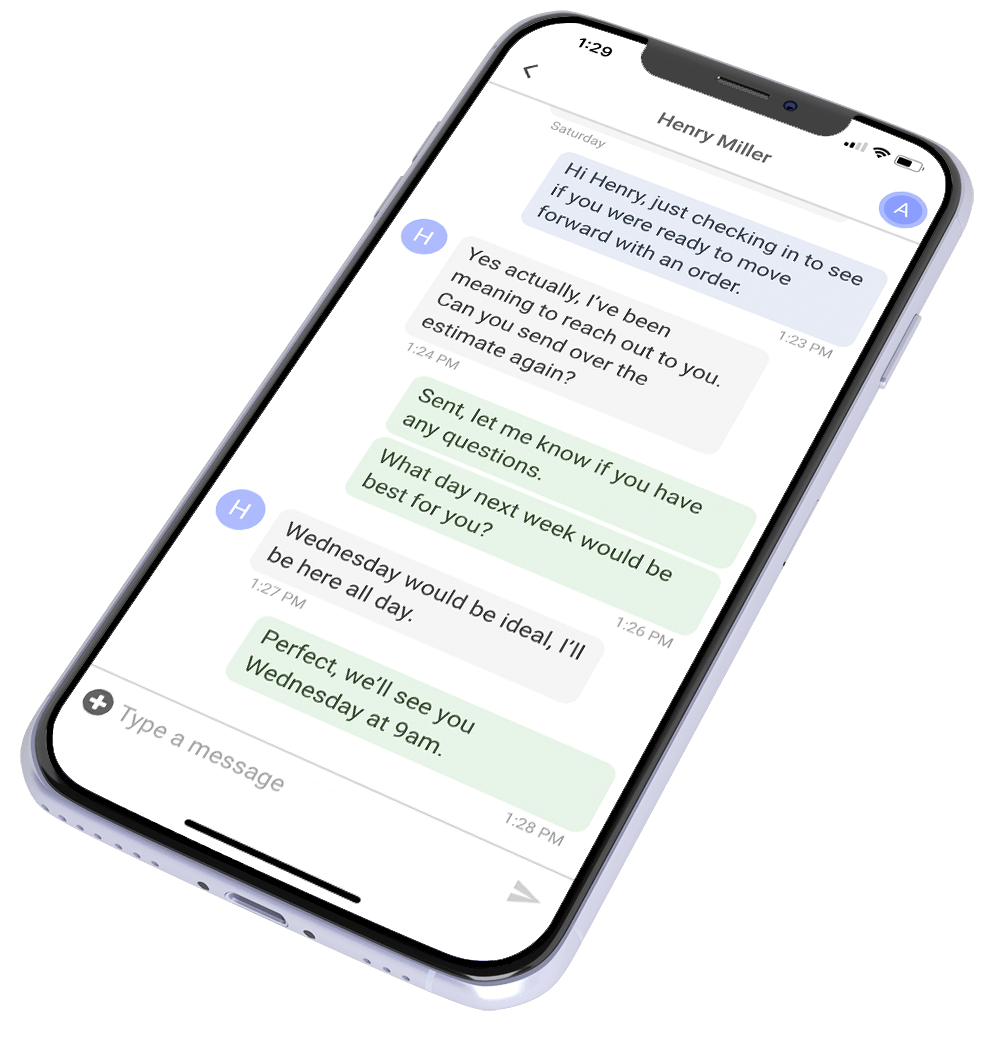
Spot these 6 red flags before you get stuck with the wrong roofing CRM
Choosing the right CRM for your roofing business is a make-or-break decision. It’s easy to get swept up by a flashy sales pitch, dazzled by features, and miss warning signs beneath the surface. That’s where this guide steps in. We’ll help you catch the subtle cues that the CRM you’re considering might not solve your problems—and help you avoid headaches before they begin.
Roofing businesses move fast, leaving no room for clunky software. You need something that works on the go, keeps up with your crew, and prevents missed leads or follow-ups. But picking the right fit isn’t easy. The market is full of tools, all promising the best. How do you know which one will keep your business moving and which one will slow you down?
This article highlights six red flags roofing companies often miss when evaluating CRMs. If you overlook them, you could be stuck dealing with issues that drain time, money, and patience. By the end, you’ll know exactly what to look for when researching or sitting through a demo.
Red Flag 1: Vague or Evasive Responses About Customization
Why Customization Matters for Roofers
Roofing is unique. Your projects vary week by week. One day you’re on a residential repair, the next, a commercial build. A one-size-fits-all CRM won’t adapt to how you work. You need a tool that molds to your process—letting you set stages, track inspections, send quotes, and follow up in ways that work for your team. A good CRM should fit your business, not force you into a generic system.
The Red Flag: Evasive Sales Reps
If a sales rep dodges questions about customization, it’s time to pause. If they say something like, “Most users are fine with the default setup,” it’s a sign the system won’t adapt to your needs. This is bad news when you try to use the CRM for your jobs, workflow, and customers. Don’t settle for forcing your business into their box.
What to Ask Instead
Push for clear answers. Ask, “Can I adjust the stages in my sales pipeline?” and “How customizable are the reports?” If they avoid direct answers, you’re likely dealing with a rigid system. The right CRM should allow full flexibility.
Reviews to Watch For
Look for reviews mentioning limited customization or complaints about rigid workflows. If you see repeated issues, take that as a clear sign this CRM could trap you in a slow, frustrating process.
Red Flag 2: Overemphasis on Desktop Functionality
Why Mobile is Critical for Roofers
Roofers don’t sit behind desks. The job happens in the field—on roofs, at sites, or in the truck. If your CRM only works on a desktop, it’s not built for your world. Mobile functionality needs to be seamless. Send quotes from the job site? Check. Follow up with a lead between gigs? No problem. Your business moves fast, and a CRM that can’t keep up is a deal-breaker.
The Red Flag: Sales Rep Glosses Over Mobile
If the rep talks up desktop features but brushes off mobile, be cautious. A simple “We have an app too” without a demo is a red flag. Mobile isn’t an afterthought—it’s essential. If it doesn’t perform on-site, it’s not worth your time.
What to Look for in a Demo
During the demo, focus on mobile features. Ask questions like, “Can you show me the app in action?” and “How fast can I send a quote from my phone?” You need to see proof that the CRM performs on the go.
Reviews to Watch For
Look for complaints about mobile issues—clunky apps, crashes, slow load times. Read low-star reviews closely. If mobile is a frequent pain point, move on.
Red Flag 3: “We Handle Data Migration for a Fee” or “It’s Easy!”
The Importance of Seamless Data Migration
Switching CRMs is like moving to a new house—exciting but risky if things get lost. For roofers, migration means transferring every job detail, customer note, and dollar owed. You’ve built your business on that info. If it’s mishandled, it can cost you weeks of lost productivity. A smooth transfer keeps everything running. But if it fails, you’ll be scrambling to piece it back together.
The Red Flag: Simplified or Fee-Based Migration Promises
If a sales rep says, “It’s easy!” or adds a migration fee, proceed with caution. Migration is rarely simple, and sales teams often downplay the effort involved. They’ll gloss over details, hoping you won’t ask too many questions. Don’t fall for it. You need specifics, not vague promises.
What to Ask During the Demo
Be direct. Ask, “Can you explain the data migration process step by step?” and “What support do you provide during migration?” If they can’t walk you through it clearly, it’s a red flag.
Reviews to Watch For
Look for reviews mentioning data loss, incomplete transfers, or unexpected migration costs. If migration horror stories keep surfacing, steer clear.
Red Flag 4: “We’re Working on That Feature” or “It’s on the Roadmap”
Why a CRM’s Feature Set Must Be Complete
Roofers can’t afford gaps in their CRM. From day one, it needs to cover the essentials—communication, automation, conversation history, and customizable stages. These aren’t extras; they’re critical. Whether following up on leads or managing quotes, your CRM should handle it all. If it can’t do that from the start, it’s not worth your time.
The Red Flag: Promised Features on a Future Roadmap
If a sales rep says, “It’s on our roadmap,” be cautious. Promises about future features often lead to disappointment. If the CRM doesn’t have what you need now, it likely won’t deliver soon. Roofers can’t wait on “coming soon.”
What to Look for in a Demo
During the demo, ask directly, “Is this feature available now?” and “When will it launch?” If they can’t give a clear timeline, be wary. Roadmaps often stretch into months—or years.
Reviews to Watch For
Check the 2-3 star reviews. Look for complaints about promised features that were delayed or never delivered. If frustrations about delays are common, keep looking.
Red Flag 5: Suspicious Review Patterns—Too Many Extremes
The Danger of Polarized Reviews
If a CRM has mostly five-star reviews with a few one-stars sprinkled in, be cautious. It could signal inconsistency or that the product is oversold. Worse, glowing reviews might be incentivized, while frustrated customers are brutally honest. When reviews swing too far in both directions, something’s off.
The Red Flag: Sales Reps Avoid Negative Feedback
If a sales rep only highlights positive reviews and avoids complaints, take note. No product is perfect. Honest, balanced reviews show real customers use it. If the rep avoids criticism, you’re not getting the full picture.
What to Do During Research
Don’t rely on reviews the sales team provides. Do your own research. Check trusted sites and read the one-star reviews first. If the same complaints keep coming up, like poor support or broken features, there are deeper problems.
Reviews to Watch For
Look for phrases like “unreliable,” “support takes forever,” or “mobile doesn’t work.” If many users report the same struggles, you’ll likely face them too.
Red Flag 6: Lack of Clear Exit Strategy
Why an Exit Plan Matters
No matter how good a CRM seems, you need to know you can leave without losing your data or paying hefty fees. Business needs change—maybe the CRM won’t grow with you, or it costs more than it’s worth later. Without a clear exit plan, you risk getting stuck. A solid plan ensures you stay in control, even if you move on.
The Red Flag: Evasive Responses About Exiting
Ask the sales rep, “What happens if I want to leave?” If they dodge the question or say, “You won’t want to switch,” it’s a red flag. It likely means tough data export processes or high fees. A good CRM lets you exit on your terms.
What to Ask in the Demo
Ask directly, “Can I export my data anytime?” and “Are there fees to cancel or switch?” The answers should be clear. If the rep dodges or complicates it, beware.
Reviews to Watch For
Look for reviews mentioning “vendor lock-in,” “hidden fees,” or “data export issues.” These complaints often show up in the one- or two-star range. If others have struggled to leave, you probably will too.
Conclusion
Choosing the right CRM can make or break your roofing business. Miss the red flags, and you might end up with a system that slows you down, ties you up, or costs you time and money. Spotting these issues early helps you avoid headaches and get a tool that works for you, not against you.
From customization to mobile functionality, seamless data migration, and a clear exit strategy, the right CRM should fit your business from day one. Don’t settle for a system that overlooks the essentials or makes empty promises. Your business moves fast, and your CRM should keep up. Now’s the time to dig into the details, ask tough questions, and read the fine print. Take control with a CRM that delivers where it matters, so you can focus on what you do best—putting roofs on homes.
Ready to take your roofing business to the next level? Proline CRM offers what you need. That’s because it’s a communication-first CRM. You can access conversation histories in just a few clicks. And it sends texts and emails automatically without you lifting a finger. Don’t just take our word for it. Book a demo to see it in action!
You can also check out our CRM walkthrough.
It’s an easy way to dip your toes in the water before you book that demo!



